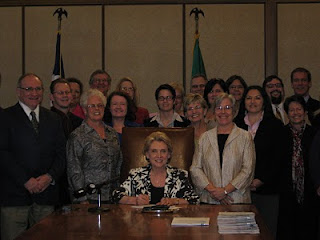During the past three weeks, DEL staff members have visited eight cities throughout the state to collect comments on recommended changes to the licensed family home child care rules. To view the recommended draft rules, click here.
“Some of the provider groups had been meeting prior to the forums to review and draft comments. Some were hearing the information for the first time,” said Judy Jaramillo, DEL policy analyst. “I was impressed with the passion that was expressed by the participants. We received some very valuable input and will continue to compile the comments as we move forward with the next draft.”
DEL is revising rules for licensed family home child care in Washington Administrative Code (WAC) chapter 170-296, using a unique process called “negotiated rule making.” Recommendations came from the Negotiated Rule Making Team, which included a large representation of child care providers, SEIU staff, DEL staff, Child Care Resource & Referral staff, provider advocates and parent advocates. For more information about the team and the process, visit our negotiated rule making web page.
The next steps will be for DEL to review all the comments, then write the next draft. For questions about the process, e-mail rules@del.wa.gov.
When the new WAC is adopted in December 2010 it will completely replace the current rules. Until the final draft is adopted, the current Family Home WAC is still in effect.
Thank you to everyone who participated and provided feedback during this important process!









